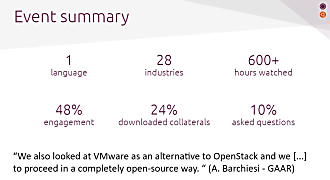Arturo Suarez
on 9 July 2015
Introducing utility pricing to your Managed Private Cloud

Canonical is proud to introduce one of the most exciting, on-demand, usage-based consumption models yet – and it’s for our managed private cloud service, BootStack.
While public cloud, consumption-based pricing has changed the economics (for the better) of how companies and individuals procure compute resources, private clouds have continued to remain stagnant in how they are procured. Much like traditional IT – with pricing, design and payment terms specified on a relatively inflexible per-customer, or per-host, or per-CPU basis, etc. – the traditional model has some benefits to some customers, but it’s not ideal for everyone. It also makes it difficult for customers to compare “apples to apples” when deciding on new technology implementations. Canonical aims to change all that.
To address this need we introduced a new pricing per VM/hour model for our OpenStack support and managed clouds during Mark Shuttleworth’s keynote at the last OpenStack Summit in Vancouver.
Its rationale is based on a new service-centric way of consuming IT. We’re effectively extending the utility-based consumption model that the public cloud vendors adopted for public IaaS into the platform and application domains of private clouds. An IT department can now easily calculate the cost of running any service during a defined period of time just by knowing how many units (VMs or containers) make up that service (out of the box information if you are using Juju).
As BootStack increases the number of technical and financial choices available and makes its way into different industries (Telco, Legal, Financial Services), we’ve been looking for different ways to help our customers make the right choice of OpenStack consumption model.
The model is simple:
- 5¢ per virtual machine running per hour running on your cloud, regardless of the size.
- 4¢ per GB of storage used (not usable, not available, but consumed without taking into account replicas)
- Both are fully managed, built and operated to a SLA with no upfront payment.
Do the math and you’ll find out that you can now reach interesting economics in the Cloud at a much smaller scale than with the regular private cloud pricing. You can now compare directly to your public cloud expenditure providing you have a good cost allocation model of the underlying hardware.
Now that you’re able to compare “apples to apples” on pricing you can now focus on the main benefits of your fully managed OpenStack private cloud: control of your infrastructure, innovation by default, interoperability, no vendor lock in and no investment in hiring scarce (as in expensive) skilled engineers.
If you want to know more about BootStack pricing and sizing and whether this model is appropriate for your particular case, do not hesitate contacting us and we’ll be happy to assist.



